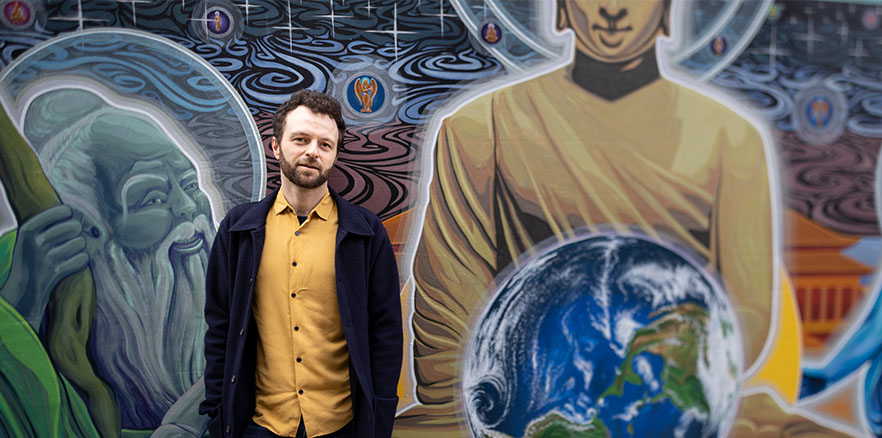
Dr Joseph Watts
An Otago researcher looking at how people of different cultures perceive and communicate mental states hopes his work will create greater understanding between world views.
Dr Joseph Watts has a PhD in Psychology from Auckland University and has been a lecturer in Otago's Religion programme since 2020. He is a core member of Otago's Centre for Research on Evolution, Belief and Behaviour and an External Research Associate of the Max Planck Institute for the Science of Human History.
He says religious systems are fascinating because they pervade so many aspects of human life.
"This cross-cultural variation has the potential to challenge long-held beliefs about the nature of Theory of Mind and its importance in human social and cognitive abilities.”
“Studying Religion provides the freedom to study anything from the micro-cognitive processes of the human mind up to the macro structures of international relations.”
He is currently Ieading a Marsden-funded project titled “Cross-cultural Patterns in Theory of Mind: Using text analytics to identify structure and variation in mental state attributions in the Pacific”.
The project, in collaboration with Victoria University's Dr Jason Low and Auckland University's Dr Simon Greenhill, seeks to investigate the semantic structure of mental state vocabulary across six languages, with a particular focus on Pacific languages.
Researchers have spent thousands of hours reading through historic dictionaries, children's stories and other documents as well as consulting with language experts to create extensive word lists relating to the mind across French, English, Spanish, Tongan, Samoan and Māori. On average, around five to seven per cent of all the words in each language represent states of mind.
While still in the early stages of analysis, Watts and fellow Religion programme colleague Rachael Richter-Gravier have identified a distinction in how different cultures perceive and communicate their mental states, beliefs, desires and emotions. For example, the same state of mind in one language may carry positive connotations, while in another be perceived negatively.
One early finding indicates a greater emphasis in te reo Māori on emotional states of mind, compared with European languages.
"This cross-cultural variation has the potential to challenge long-held beliefs about the nature of Theory of Mind and its importance in human social and cognitive abilities.”
“People have an exceptional capacity to infer the beliefs, emotions, intentions and desires of one another and this capacity is known as Theory of Mind,” explains Watts. “This has been often regarded as a human universal that provides the foundation of social learning, empathy, cooperation and communication. However, there is growing recognition that the way people conceptualise and communicate mental states varies across languages, particularly in the Pacific."
Watts grew up in rural Whanganui, completing his undergraduate studies at Massey and Victoria University of Wellington and his BA (Hons) and PhD in Psychology at the University of Auckland.
Prior to joining the University of Otago, he was a Research Fellow in the Social and Evolutionary Neuroscience Group at Oxford University, and a Postdoctoral Researcher in the Department of Linguistic and Cultural Evolution at the Max Planck Institute for the Science of Human History.
Watts, who says he is driven by curiosity, hopes this latest study could impact the way therapy is informed, adapted and conducted or, more broadly, create greater understanding between different cultures.
“Understanding from a cultural perspective what a person means when they describe a particular state of mind could go a long way in reducing misunderstandings between cultures.”
He adds that he is grateful to have a fantastic team of colleagues in Otago's Religion programme.
Recent awards
- University of Otago Early Career Research Award (2022)
- Vice-Chancellor's Prize for Best Doctoral Thesis (2017)
Funding
- Marsden Fund
More stories about early career researchers
This story is part of the research publication 'He Kitenga 2022: Talented Futures', which presents the different pathways into research that early career researchers follow.